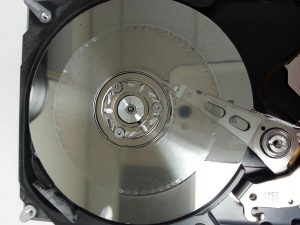Recently, MaxDigitalData began selling a 14 terabyte (TB) hard drive on Amazon and other online platforms for about $120 USD. That’s an incredible deal — but as is often the case with budget storage media, there’s a catch.
As TechRadar notes, MaxDigitalData (which also goes by the name MDD) sells refurbished hard drives, along with new models. While many of their products seem new, they’ve already reached their expected end-of-life.
It’s important to note that replacing certain components of a hard drive — such as the spindle, motor, and other moving parts — can, in theory, restore the drive to a functional condition. But repaired hard drives are not “new” hard drives, and in our opinion, they’re not trustworthy.
Related: Why “Hard Drive Repair” Doesn’t Really Exist
Why Used Hard Drives Aren’t Reliable Enough for Long-Term Storage
Hard disk drives (HDDs) are extremely specialized devices. Reputable manufacturers use a variety of techniques to balance HDD performance and capacity.
Most newer drives have device-specific firmware, which optimizes reliability while enabling the HDD to maintain adequate spin-up times, seek error rates, and other key metrics.

Rotational damage to hard drive platters.
When hard drives are refurbished, the manufacturer may simply wipe the SMART data that tracks the HDD’s historical performance — but they’re probably not rewriting the firmware or optimizing the drive in any other capacity.
We do not know what MDD does to their refurbished hard drives, and it’s possible that they have a testing process to weed out “bad” drives with large numbers of uncorrectable sectors. They may not sell drives that have operated for excessive periods of time, or drives that have shown signs of physical damage. It’s also noteworthy that MDD provides a warranty on their products.
Even so, you get what you pay for — and used hard drives are simply less reliable. HDDs have an expected operating lifespan of 3-5 years. Past this point, the likelihood of actuator head failures rises dramatically, endangering your data.
And when you purchase a used hard drive, you can’t know how it was used. A hard drive in a cryptocurrency mining rig will have much more wear than a hard drive used in a business laptop.
Related: Amazon Continues Selling Fake Flash Drives and SSDs
Are refurbished hard drives ever a good purchase?
If you’re running a home RAID (Redundant Array of Inexpensive Disks) that stores relatively unimportant data, you might simply need some storage media to plug into the array. In that case, a refurbished hard drive might be an acceptable risk.
And as we noted above, MDD also sells new hard drives. We haven’t evaluated new MDD drives for reliability, and it’s possible that they’re reliable products.
But thanks to rising areal densities, high-capacity HDDs from well-known manufacturers are fairly inexpensive. We’d stick with products from major brands — and avoid purchasing storage media through large online retailers or auction websites.
Remember, every hard drive can (and will) fail. Choose an appropriate backup strategy, and if a storage device fails without a backup, contact a qualified data recovery provider as soon as possible.
If you’ve lost data due to an HDD failure, we’re here to help. Datarecovery.com provides risk-free evaluations and a no data, no charge guarantee: If we’re unable to recover important data, you don’t pay for the attempt.
To discuss hard drive data recovery with an expert, contact us online or call 1-800-237-4200.





